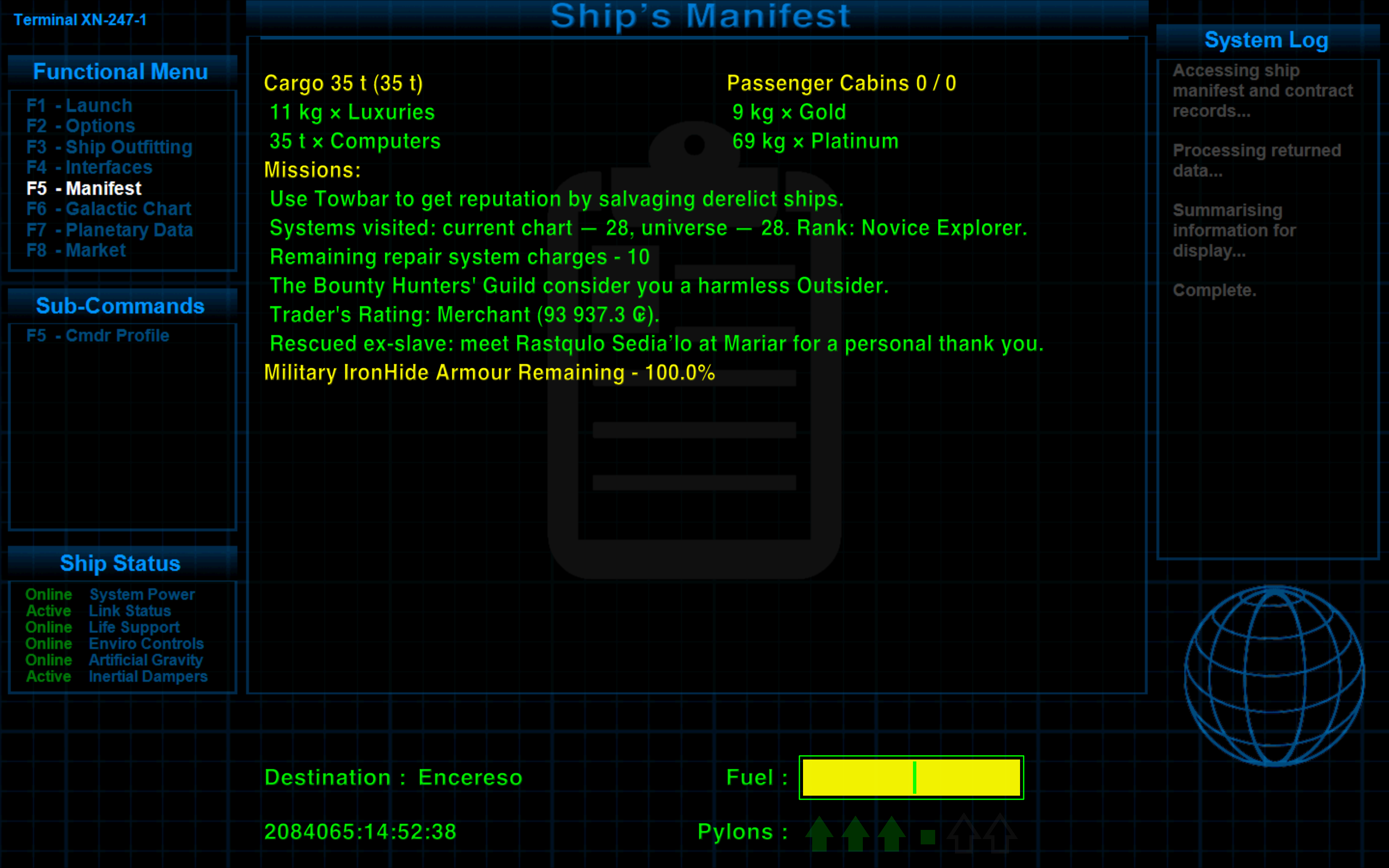There are two points I consider significant about Wildeblood's insight:
1) "The original attraction of Elite and similar is supposedly that they are open-ended sandbox games. The very concept of quests/missions seems to be at odds with that."
Rather than focus on terminology ("open-ended sandbox") and the ensuing consequences resulting from that definition (the game must be like
this in order to be defined as "open-ended sandbox"), I'd like to propose a different approach.
To me, Elite etc. are trying to simulate Real Life™. If I am born in Haiti with a car and a small wallet of dosh, I can decide what to do. I can drive around doing business. I can work as a taxi driver. I can try and fight the gangsters. I can go elsewhere.
Et cetera. Now, if somebody offers me a job (= mission), I can
also decide whether or not to take it. As in Oolite. I don't have to take any of the GalCop Missions - or Long Way Round, or chase the Constrictor.
All the missions oxps do (for me) is simulate Real Life a little more by offering more structured opportunities which I can choose between - or ignore. As I do in Real Life.
2) Wildeblood's main point:
I was explicating the psychological mechanism that maintains player interest in the vanilla game. Because it works the way it does, it has little use for quests. (Where "it" is an anthropomorphized mental representation of the game's computer code, assigning to "it" agency which - I hope - it does not actually have.) Therefore it has few resources in its code to facilitate quests. Therefore there is not one "official" correct way to author a mission, using the provided resources.
In particular, there is not any central register of story elements - persistent characters, quest-able objects, locations, etc. Everyone who creates a mission OXP has to create separate data structures, and hope their story doesn't collide with other OXPs.
I find this an interesting insight - and have been ruminating about it.
I would suggest that it is definitely true at the outset of gameplay. And (presumably) throughout the vanilla game.
But not "later on" in the OXP'd game. What can you spend all that money on once you have fully equipped your ship? Apart from buying another, what can you do with it? And where is the impetus to keep on trading once your coffers are bulging with dosh?
This surely is where the missions come in. Combat with a point. Things to
do now that one is relatively invulnerable. (
Some people will want these things earlier, without needing the grind to outfit one's ship). I suspect that the various vanilla game contracts operate in this fashion, too.
I've noticed that Cody, for example, has over the years here on the BB, written on the one hand of the massive contract payouts which he worked his way up to - and then on the other hand, of his various fights.
I also notice that there
are OXPs which prolong the process of "outfitting the ship"
*buy a more expensive ship (eg. a 1,200,000₢ Caduceus)
*Ship Configuration OXP (Oodles more varieties of equipment)
*Hermitage (equip your Rock Hermit)
- and also Home System which provides something to do with extra dosh: note that these mostly seem to be from Phkb's stable).
For myself (lousy combat skills), I trade so that I can upgrade my ship. So I'm avoiding combat. Weapon Laws OXP makes this upgrading more of a challenge and an adventure. SniperLock makes combat more possible. But once my ship is equipped, I start to loose interest in trading and become more interested in combat and missions. I've several Jamesons created to try out various missions but which were "given up" as they just needed too many kills (unenjoyable grind!) to start the missions. I enjoy kitting out the Cobra the most, I think. (I'm currently building up yet another one so that I can try out DGill's latest "Feudal States Inamorata 1.0"/Feudal States v.3.8.0?).
